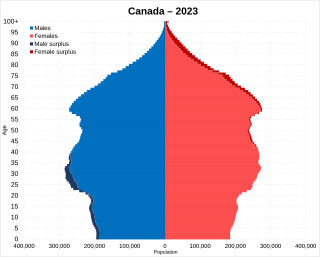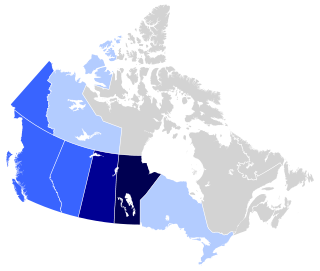
Statistics Canada conducts a country-wide census that collects demographic data every five years on the first and sixth year of each decade. The 2021 Canadian census enumerated a total population of 36,991,981, an increase of around 5.2 percent over the 2016 figure. It is estimated that Canada's population surpassed 40 million in 2023 and 41 million in 2024. Between 1990 and 2008, the population increased by 5.6 million, equivalent to 20.4 percent overall growth. The main driver of population growth is immigration, with 6.2% of the country's population being made up of temporary residents as of 2023, or about 2.5 million people. Between 2011 and May 2016, Canada's population grew by 1.7 million people, with immigrants accounting for two-thirds of the increase.

According to the 2021 Canadian census, over 450 "ethnic or cultural origins" were self-reported by Canadians. The major panethnic origin groups in Canada are: European (52.5%), North American (22.9%), Asian (19.3%), North American Indigenous (6.1%), African (3.8%), Latin, Central and South American (2.5%), Caribbean (2.1%), Oceanian (0.3%), and Other (6%). Statistics Canada reports that 35.5% of the population reported multiple ethnic origins, thus the overall total is greater than 100%.
Slovene Canadians are Canadian citizens of Slovene descent or Slovenian-born people who reside in Canada.
Swedish Canadians are Canadian citizens of Swedish ancestry or Swedes who emigrated to and reside in Canada. The Swedish Canadian community in Canada numbered 349,640 in the 2016 population census. The vast majority of them reside west of Lake Superior, primarily in Winnipeg, Calgary, Edmonton and Vancouver. Toronto is the most popular settlement spot for newcomers. Despite having an influential presence and distinctive cultural bond, only 14,000 Canadian persons of Swedish descent speak Swedish.
Icelandic Canadians are Canadian citizens of Icelandic ancestry, or Iceland-born people who reside in Canada.
Afghan Canadians are Canadians with ancestry from Afghanistan. They form the second largest Afghan community in North America after Afghan Americans. Their ethnic origin may come from any of the ethnic groups of Afghanistan, which include Pashtun, Tajik, Uzbek, Hazara, Turkmen, etc. In the Canada 2016 Census about 83,995 Canadians were from Afghanistan.

Russian Canadians comprise Canadian citizens of Russian heritage or Russians who immigrated to and reside in Canada. According to the 2021 Census, there were 548,140 Canadians who claimed full or partial Russian ancestry. The areas of Canada with the highest percentage population of Russian Canadians are the Prairie Provinces.
Laotian Canadians, are Canadian citizens of Laotian origin or descent. In the 2016 Census, 24,580 people indicated Laotian ancestry. Bilateral relations between Canada and Laos were established in 1954 with the formalization of the independence of the Kingdom of Laos from France. In August 2015, Canada's first resident diplomat opened the Office of the Embassy of Canada in Vientiane, Laos.
Romanian Canadians are Canadian citizens of Romanian descent or Romania-born people who reside in Canada.
Danish Canadians are Canadian citizens of Danish ancestry. According to the 2006 Census, there were 200,035 Canadians with Danish background, 17,650 of whom were born in Denmark.
Welsh Canadians are Canadian citizens of Welsh descent or Wales-born people who reside in Canada.
Jamaican Canadians are Canadian citizens of Jamaican descent or Jamaican-born permanent residents of Canada. The population, according to Canada's 2021 Census, is 249,070. Jamaican Canadians comprise about 30% of the entire Black Canadian population.

Mexican Canadians are Canadian citizens of Mexican origin, either through birth or ethnicity, who reside in Canada. According to the 2021 Census, 55,380 Canadians indicated they were of full or partial Mexican ancestry. They are part of the broader Latin American Canadian community.
Egyptian Canadians are Canadian citizens of Egyptian descent, first-generation Egyptian immigrants, or descendants of Egyptians who emigrated to Canada. According to the 2011 Census there were 73,250 Canadian citizens who are from Egypt, having an increase compared to those in the 2006 Census.
Cambodian Canadians are Canadians of Cambodian ethnic origin or descent. There are a total of 38,490 Canadian Cambodians, most of whom reside in Toronto and Montreal.
Azerbaijani Canadians are Canadian citizens and permanent residents of ethnic Azerbaijani background, or those who were born in Azerbaijan. Most Azerbaijani-Canadians have immigrated to Canada from the Republic of Azerbaijan, Iran, Russia or Turkey.
Belgian Canadians are Canadian citizens of Belgian ancestry or Belgium-born people who reside in Canada. According to the 2011 census there were 176,615 Canadians who claimed full or partial Belgian ancestry. It encompasses immigrants from both French and Dutch-speaking parts of Belgium.
Austrian Canadians are Canadian citizens who are of Austrian ancestry or Austrian-born people who reside in Canada. According to the 2021 Census, there were 189,535 Canadians who claimed either full or partial Austrian ancestry.

Yugoslav Canadians are Canadians of full or partial Yugoslav ancestry. At the 2016 Census, the total number of Canadians whose origins lie in former Yugoslavia, majority of whom indicated specific ethnic origin, was 386,340 or 1.12% of the total population.




